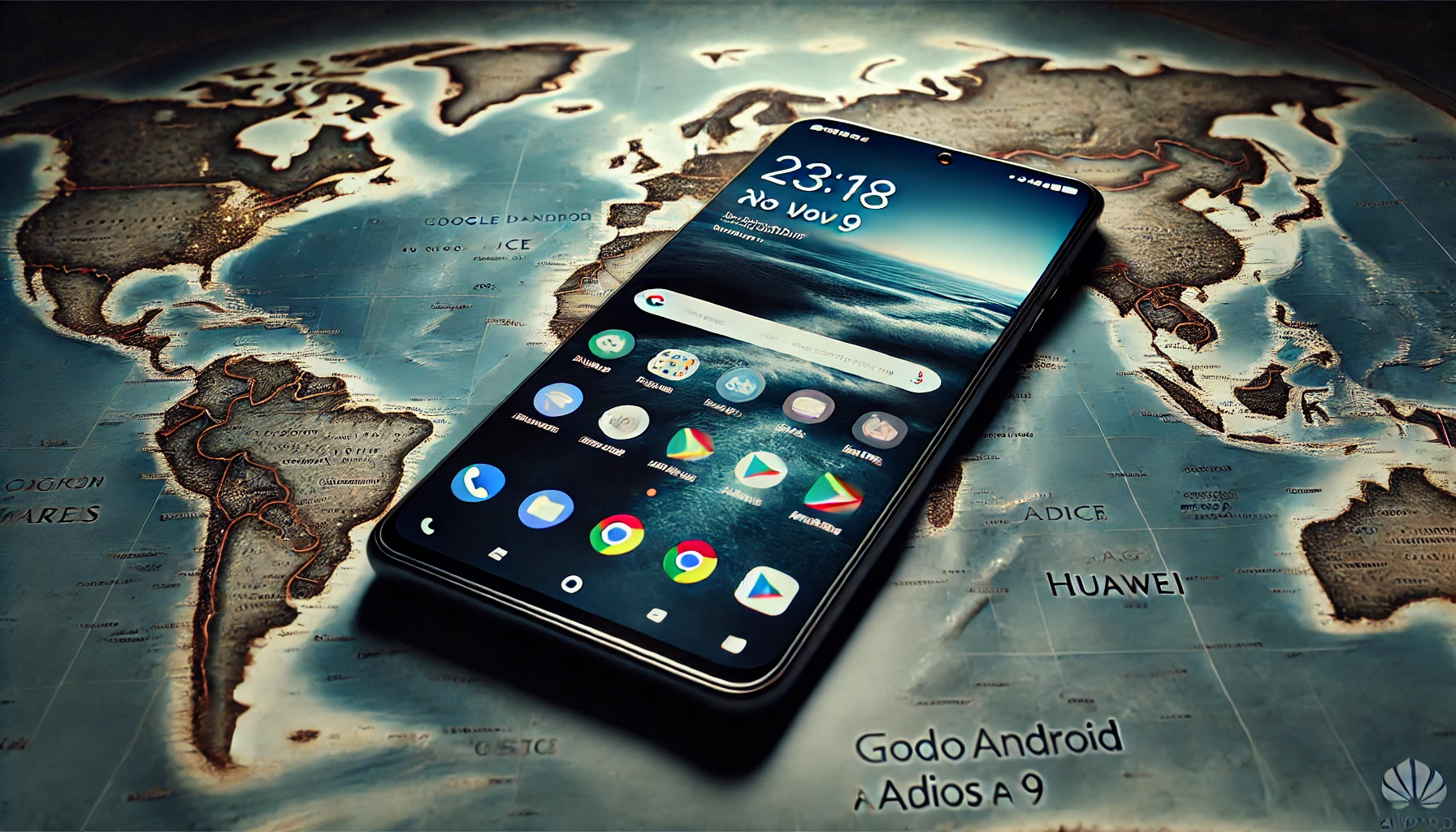The article at https://todoandroid.live/google-dice-adios-a-huawei/ provides an in-depth look into Google’s decision to cease its partnership with Huawei. It explores the background leading up to this significant move in the tech industry.
Key factors influencing this decision include geopolitical tensions and business strategies aimed at reshaping the competitive landscape. The article delves into how these elements have collectively impacted the relationship between Google and Huawei.
Additionally, the piece examines the broader implications for the smartphone market, highlighting potential shifts in market share and consumer preferences. It offers readers a comprehensive understanding of the situation from multiple perspectives.
Finally, the article discusses the immediate reactions from both companies and the tech community, setting the stage for future developments in this evolving narrative.
The Impact of https://todoandroid.live/google-dice-adios-a-huawei/ on Huawei’s Ecosystem
The departure highlighted in https://todoandroid.live/google-dice-adios-a-huawei/ significantly affects Huawei’s ecosystem. Without Google’s support, Huawei devices lose access to essential services like the Google Play Store and native apps, impacting user experience.
This loss forces Huawei to accelerate the development of its proprietary HarmonyOS, aiming to reduce dependency on external software providers. The transition presents challenges, including ensuring app compatibility and maintaining user satisfaction during the shift.
Furthermore, the ecosystem disruption extends to developers who previously catered to Huawei’s user base through Google’s platforms. They now face the need to adapt their apps to HarmonyOS, potentially leading to reduced app availability and innovation.
Lastly, the impact resonates through Huawei’s hardware offerings, as the integration of Google’s services was a key selling point. The company must now find alternative ways to differentiate its products and retain its competitive edge in the market.
https://todoandroid.live/google-dice-adios-a-huawei/: What Users Need to Know
Users reading https://todoandroid.live/google-dice-adios-a-huawei/ will find essential information about how Google’s exit affects their Huawei devices. Key among these is the loss of access to Google Mobile Services (GMS), which includes popular apps like Gmail, YouTube, and Google Maps.
The article advises users on alternative app sources, such as Huawei’s AppGallery, which is rapidly expanding its library to compensate for the absence of GMS. It also provides tips on securing devices and ensuring privacy during this transition period.
Additionally, users are informed about potential software updates and support from Huawei, ensuring their devices remain functional and secure without Google’s services. The piece underscores the importance of staying informed to navigate the changes smoothly.
Lastly, the article explores community-driven solutions and forums where users can share experiences and strategies, fostering a supportive environment for those adapting to the new ecosystem.
Future Prospects After https://todoandroid.live/google-dice-adios-a-huawei/
Looking ahead, https://todoandroid.live/google-dice-adios-a-huawei/ discusses the future prospects for both Google and Huawei. For Huawei, the focus shifts to strengthening its own software capabilities and expanding its market presence without reliance on Google’s ecosystem.
The article predicts that Huawei will invest heavily in HarmonyOS and its AppGallery to create a robust alternative for users. This strategic pivot aims to attract developers and users alike, fostering a self-sustaining ecosystem that can compete with established players.
On Google’s side, the exit allows the company to reassess its partnerships and explore new opportunities in other markets. It may lead to stronger collaborations with different manufacturers, potentially reshaping the Android landscape.
Finally, the piece considers the broader tech industry’s response, anticipating increased innovation and competition as companies navigate this significant shift. The future remains dynamic, with numerous possibilities unfolding from this pivotal change.
Alternatives for Huawei Devices Post-Google Departure
With Google’s departure as detailed in https://todoandroid.live/google-dice-adios-a-huawei/, Huawei users seek viable alternatives for essential services. Huawei has been actively promoting its AppGallery, which now serves as the primary source for downloading apps previously available on the Google Play Store.
In addition to AppGallery, Huawei is enhancing its suite of proprietary apps, such as Huawei Browser and Huawei Music, to fill the gaps left by Google’s offerings. These apps aim to provide comparable functionality and a seamless user experience.
Users can also explore third-party app stores and sideloading options, although these methods come with potential security risks and require a more hands-on approach. Huawei provides guidelines and support to help users navigate these alternatives safely.
Furthermore, the integration of web-based applications offers another pathway for accessing essential services without relying on native Google apps. This approach leverages the versatility of modern web technologies to maintain functionality across devices.
The Effect of Google’s Decision on the Global Smartphone Market
The decision highlighted in https://todoandroid.live/google-dice-adios-a-huawei/ has substantial ramifications for the global smartphone market. Huawei, once a leading contender, now faces challenges in maintaining its market share without Google’s ecosystem, potentially ceding ground to competitors.
This shift opens opportunities for other Android manufacturers to strengthen their positions, as they continue to offer the full suite of Google services that consumers value. Brands like Samsung and OnePlus may benefit from Huawei’s reduced influence in certain regions.
Moreover, the move could accelerate the diversification of the Android ecosystem, encouraging more manufacturers to develop their own software solutions or collaborate with alternative service providers. This diversification may lead to increased innovation and variety in the market.
The decision also underscores the impact of geopolitical factors on technology partnerships, highlighting how international relations can shape the competitive dynamics of the smartphone industry. Companies must navigate these complexities to sustain their global presence.
Security Considerations After Google’s Goodbye to Huawei
Post the separation discussed in https://todoandroid.live/google-dice-adios-a-huawei/, security remains a paramount concern for Huawei device users. Without Google’s regular security updates, Huawei must ensure that its own systems are robust and capable of protecting user data effectively.
Huawei has committed to providing timely security patches and updates through its HarmonyOS platform, aiming to maintain high security standards. The company invests in advanced encryption and security protocols to safeguard user information against potential threats.
Users are advised to stay vigilant by regularly updating their devices and being cautious with app installations, especially when using third-party sources. Huawei’s security features, such as AppGallery’s app verification process, help mitigate risks associated with non-Google apps.
Additionally, Huawei collaborates with cybersecurity experts to continuously monitor and address vulnerabilities, ensuring that their devices remain secure in the absence of Google’s support. This proactive approach is crucial in maintaining user trust and device integrity.
How Huawei is Adapting Without Google Services
In response to the situation outlined in https://todoandroid.live/google-dice-adios-a-huawei/, Huawei is actively adapting by developing and enhancing its own ecosystem. The company is accelerating the rollout of HarmonyOS, its proprietary operating system designed to offer a seamless and integrated user experience.
Huawei is also expanding its AppGallery, investing in partnerships with developers to ensure a diverse and robust selection of applications. This initiative aims to replicate the functionality and convenience previously provided by Google’s services, ensuring users have access to essential apps.
Furthermore, Huawei is focusing on hardware innovations, integrating advanced technologies that complement its software offerings. By leveraging its expertise in areas like camera technology and battery efficiency, Huawei seeks to differentiate its devices in a competitive market.
The company is also exploring strategic alliances and collaborations to enhance its ecosystem’s capabilities, ensuring that users receive a comprehensive and reliable experience despite the absence of Google services.
Comparing Huawei to Other Brands Without Google Support
The scenario presented in https://todoandroid.live/google-dice-adios-a-huawei/ allows for a comparison between Huawei and other smartphone brands operating without Google’s support. Brands like Xiaomi and Oppo have also developed alternative ecosystems, though to varying extents, showcasing different strategies to mitigate the impact of limited Google services.
Huawei’s proactive development of HarmonyOS and aggressive expansion of AppGallery positions it as a leader among brands seeking independence from Google. In contrast, other manufacturers may rely more heavily on third-party app stores or web-based applications to fill the service gap.
The effectiveness of these strategies varies, with Huawei’s comprehensive approach offering a more integrated and user-friendly experience. Other brands might face challenges in achieving the same level of ecosystem cohesion, potentially affecting user retention and satisfaction.
This comparison highlights the importance of a robust and self-sufficient ecosystem in maintaining competitiveness in the absence of Google’s extensive suite of services. Huawei’s efforts set a benchmark for other brands navigating similar transitions.
Accessing Google Apps on Huawei Devices Post-Goodbye
Following the departure detailed in https://todoandroid.live/google-dice-adios-a-huawei/, accessing Google apps on Huawei devices requires alternative approaches. Users can consider sideloading Google apps, which involves manually installing APK files from trusted sources. However, this method poses security risks and may lead to compatibility issues.
Another option is using third-party app stores that offer a selection of Google apps, though availability and reliability can vary. Huawei’s AppGallery continues to expand, but it may not fully replicate the breadth of Google’s offerings, necessitating the use of alternative applications that provide similar functionality.
Web-based versions of Google services offer a viable workaround, allowing users to access essential tools like Gmail and Google Drive through their browsers. While not as seamless as native apps, this approach ensures continued access to important services without compromising device security.
Lastly, Huawei is encouraging developers to port their apps to HarmonyOS, gradually increasing the availability of native alternatives to Google apps. This ongoing effort aims to provide users with secure and integrated solutions that align with Huawei’s ecosystem.
Expert Insights on Google’s Separation from Huawei
Experts analyzing the situation in https://todoandroid.live/google-dice-adios-a-huawei/ highlight several key factors driving Google’s decision. Geopolitical tensions, particularly between the US and China, have played a significant role in shaping this business move, reflecting broader economic and political strategies.
Industry analysts note that this separation underscores the vulnerability of global tech supply chains to international relations. It serves as a case study on how geopolitical dynamics can directly influence corporate partnerships and market strategies.
Moreover, experts predict that this decision will accelerate the diversification of smartphone ecosystems, encouraging other manufacturers to explore alternatives to Google’s services. This shift may lead to increased innovation but also presents challenges in terms of maintaining user experience and app availability.
Finally, the long-term outlook suggests that both Google and Huawei will continue to evolve their strategies in response to this separation, potentially leading to new alliances and technological advancements that reshape the competitive landscape of the tech industry.
The Long-term Implications of Google’s Exit from Huawei
The long-term implications of Google’s exit from Huawei, as discussed in https://todoandroid.live/google-dice-adios-a-huawei/, extend beyond immediate business impacts. This move may lead to a more fragmented Android ecosystem, with increased emphasis on regional and proprietary services tailored to specific markets.
Huawei’s strengthened focus on HarmonyOS could influence other manufacturers to invest in their own operating systems, fostering a more diverse range of platforms within the smartphone industry. This diversification may enhance competition but also complicate app development and user migration across different ecosystems.
Additionally, the separation may encourage greater innovation in areas such as app development, security, and device integration, as companies strive to offer unique and compelling features to retain and attract users.
From a global perspective, this move highlights the increasing interplay between technology and geopolitics, suggesting that future corporate decisions will increasingly consider political and economic factors alongside traditional business metrics.
Final Thoughts on https://todoandroid.live/google-dice-adios-a-huawei/
In conclusion, https://todoandroid.live/google-dice-adios-a-huawei/ encapsulates a pivotal moment in the tech industry, marking the end of a significant partnership between two major players. This development serves as a catalyst for change, prompting both Huawei and Google to reassess and redefine their strategic directions.
Huawei’s response, focused on building a self-reliant ecosystem, demonstrates resilience and adaptability in the face of challenges. The company’s commitment to HarmonyOS and AppGallery signifies a bold step towards independence and innovation, setting the stage for a new chapter in its growth trajectory.
For Google, this separation offers an opportunity to explore new partnerships and strengthen its position in other markets, while also navigating the complexities of geopolitical influences on business operations. The long-term effects will likely shape the future dynamics of the global smartphone market.
Ultimately, this situation underscores the importance of flexibility and strategic foresight in the rapidly evolving tech landscape. Stakeholders, including consumers, developers, and industry leaders, will continue to watch closely as the implications of Google’s goodbye to Huawei unfold.

